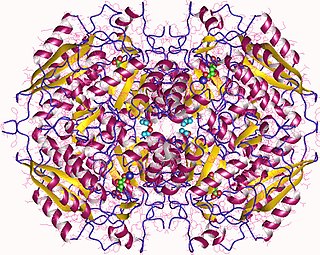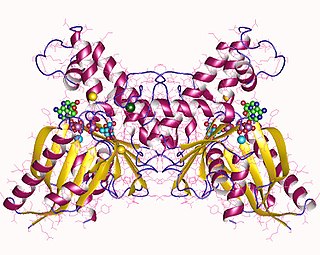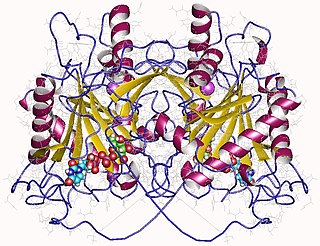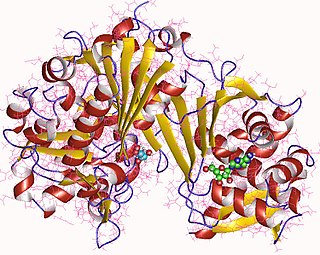
Glycolysis is the metabolic pathway that converts glucose into pyruvate and, in most organisms, occurs in the liquid part of cells. The free energy released in this process is used to form the high-energy molecules adenosine triphosphate (ATP) and reduced nicotinamide adenine dinucleotide (NADH). Glycolysis is a sequence of ten reactions catalyzed by enzymes.

Uridine-5′-triphosphate (UTP) is a pyrimidine nucleoside triphosphate, consisting of the organic base uracil linked to the 1′ carbon of the ribose sugar, and esterified with tri-phosphoric acid at the 5′ position. Its main role is as substrate for the synthesis of RNA during transcription. UTP is the precursor for the production of CTP via CTP synthetase. UTP can be biosynthesized from UDP by Nucleoside Diphosphate Kinase after using the phosphate group from ATP. UDP + ATP ⇌ UTP + ADP; both UTP and ATP are energetically equal.
In enzymology, an UDP-N-acetylglucosamine 6-dehydrogenase (EC 1.1.1.136) is an enzyme that catalyzes the chemical reaction

In enzymology, a phosphoacetylglucosamine mutase is an enzyme that catalyzes the chemical reaction
The enzyme 2-dehydro-3-deoxy-6-phosphogalactonate aldolase catalyzes the chemical reaction

The enzyme glucarate dehydratase (EC 4.2.1.40) catalyzes the chemical reaction

In enzymology, glucosamine-phosphate N-acetyltransferase (GNA) is an enzyme that catalyzes the transfer of an acetyl group from acetyl-CoA to the primary amine in glucosamide-6-phosphate, generating a free CoA and N-acetyl-D-glucosamine-6-phosphate.

In enzymology, an UDP-N-acetylglucosamine 1-carboxyvinyltransferase is an enzyme that catalyzes the first committed step in peptidoglycan biosynthesis of bacteria:
In enzymology, a poly(ribitol-phosphate) N-acetylglucosaminyl-transferase is an enzyme that catalyzes the chemical reaction
In enzymology, a 2-dehydro-3-deoxygalactonokinase is an enzyme that catalyzes the chemical reaction
In enzymology, an acetylglutamate kinase is an enzyme that catalyzes the chemical reaction:
In enzymology, a dephospho-CoA kinase is an enzyme that catalyzes the chemical reaction
In enzymology, a glucosamine kinase is an enzyme that catalyzes the chemical reaction

In enzymology, a N-acylmannosamine kinase is an enzyme that catalyzes the chemical reaction
In enzymology, an UDP-galactose—UDP-N-acetylglucosamine galactose phosphotransferase is an enzyme that catalyzes the chemical reaction
In enzymology, a phosphoribokinase is an enzyme that catalyzes the chemical reaction

In enzymology, an UDP-glucose—hexose-1-phosphate uridylyltransferase is an enzyme that catalyzes the chemical reaction

In enzymology, an UDP-N-acetylglucosamine diphosphorylase is an enzyme that catalyzes the chemical reaction

In enzymology, a xylulokinase is an enzyme that catalyzes the chemical reaction
UDP-N-acetylglucosamine kinase is an enzyme with systematic name ATP:UDP-N-acetyl-alpha-D-glucosamine 3'-phosphotransferase. This enzyme catalyses the following chemical reaction











